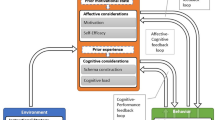Abstract
Some studies of computer-assisted instruction have shown that when students control the amount of instruction they receive, they often terminate too early and fail to learn what they should. While sophisticated adaptive systems may eliminate the problem of premature termination of study, they neglect the important goal of learner responsibility. These researchers were interested in whether giving learners information about their achievement in relation to the criterion during instruction would improve learning in both learner-controlled and program-controlled systems. Success was measured in terms of posttest scores, time on task, and number of instructional examples required during instruction.
Similar content being viewed by others
Reference Notes
Bunderson, C. V.Team production of learner-controlled courseware: A progress report (ICUE Technical Report No. 1). Provo, Utah: Institute for Computer Uses in Education, May 1973.
Tiemann, P. W., Kroeker, L. P., & Markle, S. M.Teaching verbally-mediated coordinate concepts in an ongoing college course. Paper presented at the annual meeting of the American Educational Research Association, New York, April 1977.
References
DiVesta, F. J. Trait-treatment interactions, cognitive processes, and research on communication media.AV Communications Review, 1975,23, 185–196.
Felixbrod, J. J., & O’Leary, K. D. Self-determination of academic standards by children: Toward freedom from external control.Journal of Educational Psychology, 1974,66, 845–850.
Johansen, K., & Tennyson, R. D. Review of the theory and research on the computer-based Minnesota Adaptive Instructional System.Educational Psychobgist, in press.
Merrill, M. D., & Tennyson, R. D.Teaching concepts: An instructional design guide. Englewood Cliffs, N.J.: Educational Technology, 1977.
Park, O., & Tennyson, R. D. Adaptive design strategies for selecting number and presentation of examples in coordinate concept acquisition.Journal of Educational Psychobgy, 1980,72, 362–370.
Rothen, W., & Tennyson, R. D. Application of Bayes’s theory in designing computer-based adaptive instructional strategies.Educational Psychologist, 1978,12, 317–323.
Steinberg, E. R. Review of student control in computer-assisted instruction.Journal of Computer-Based Instruction, 1977, 3, 84–90.
Tennyson, C. L., Tennyson, R. D., & Rothen, W. Content structure and management strategies as design variables in concept acquisition.Journal of Educational Psychobgy, 1980, 72, 499–505.
Tennyson, R. D. Evaluation technology in instructional development.Journal of Instructional Devebpment, 1978, 2(1), 19–26.
Tennyson, R. D. Instructional control strategies and content structure as design variables in concept acquisition using computer-based instruction.Journal of Educational Psychology, 1980, 72, 525–532.
Tennyson, R. D., Chao, J. N., and Youngers, J. Concept learning effectiveness using prototype and skill development presentation forms.Journal of Educational Psychobgy, in press.
Tennyson, R. D., & Park, O. The teaching of concepts: A review of instructional design research literature.Review of Educational Research, 1980,50, 55–70.
Tennyson, R. D., & Rothen, W. Pretask and ontask adaptive design strategies for selecting number of instances in concept acquisition.Journal of Educational Psychology, 1977,69, 586–592.
Tennyson, R. D., & Rothen, W. Management of computer-based instruction: Design of an adaptive control strategy.Journal of Computer-Based Instruction, 1979, 5, 126–134.
Author information
Authors and Affiliations
Rights and permissions
About this article
Cite this article
Tennyson, R.D., Buttrey, T. Advisement and management strategies as design variables in computer-assisted instruction. ECTJ 28, 169–176 (1980). https://doi.org/10.1007/BF02765363
Issue Date:
DOI: https://doi.org/10.1007/BF02765363




